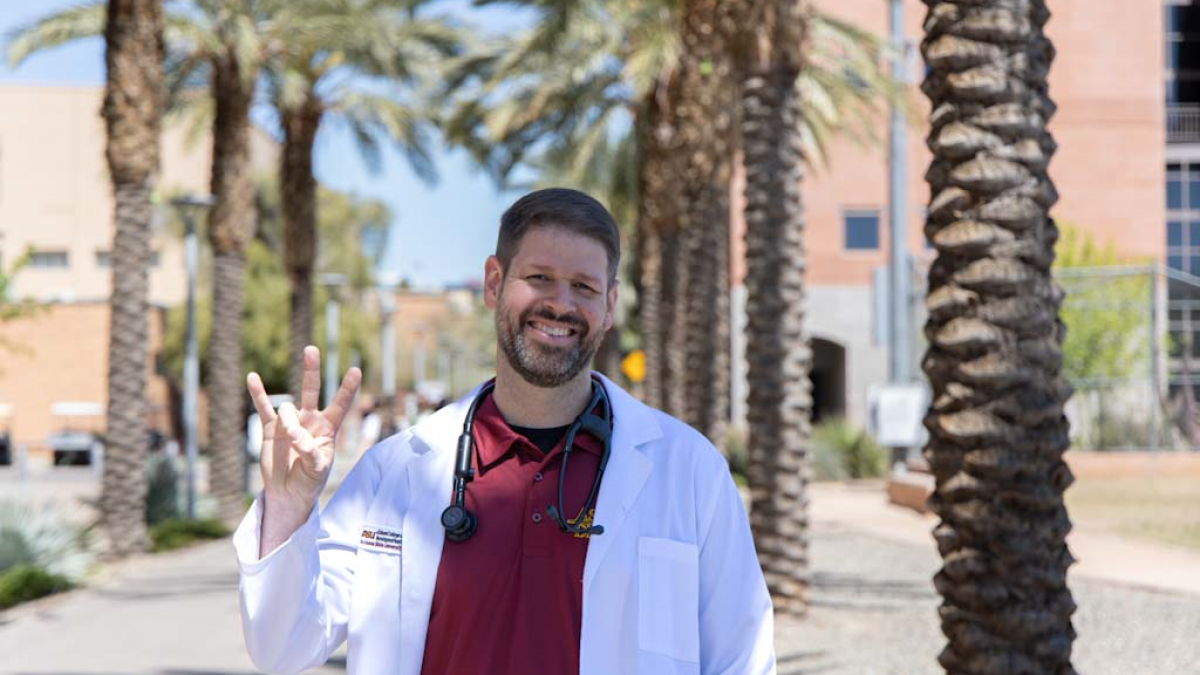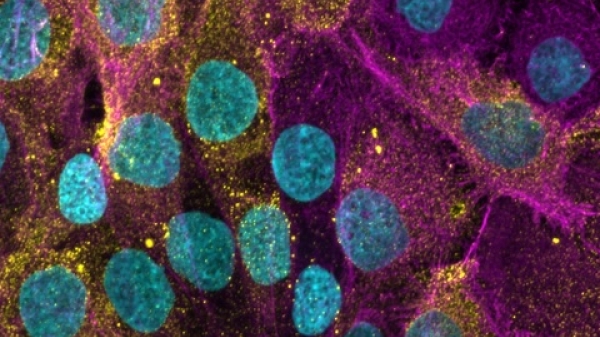Military prepared new graduate for advanced nursing practice program

Christopher Stone is capping off an exceptional academic career at ASU with plans to become a nurse practitioner post-graduation.
Editor's note: This story is part of a series of profiles of notable spring 2023 graduates.
Discipline, honor, respect and devotion are just a few of the skills and traits Christopher Stone picked up while serving as a petty officer in the U.S. Coast Guard. They are attributes that served him well as he transitioned from military life back to student life to pursue a civilian career in health care.
“The Coast Guard honed in those principles, and I think those have carried over in the medical profession and into nursing,” Stone said.
In May, Stone will achieve the highest nursing degree when he graduates from Arizona State University’s Edson College of Nursing and Health Innovation’s advanced nursing practice (family nurse practitioner), DNP program. In addition to the doctorate degree, he will also be earning the Emergency Nurse Practitioner Graduate Certificate, topping off an exceptional academic career.
It’s a major milestone for anybody but especially for Stone, a native Phoenician, who came to ASU through a less traditional route.
“I think everything happens for a reason. When I went to NAU for my undergraduate degree, my intent was to go into health care, and then when I graduated in 2007, I wasn’t ready to settle down into a profession so I got my EMT and joined the Coast Guard,” said Stone.
He spent six years in the Coast Guard and performed a number of duties, most of them related to search-and-rescue and medical services. After leaving the military, he went to a private college to get a nursing degree and then worked as an operating room nurse for a few years before making the decision to return to school to become a nurse practitioner.
“I feel like nursing for me was a natural evolution. It has so many professional opportunities, so many doors and a high ceiling,” he said.
There are a number of people who helped, supported and motivated him both personally and academically during his time at ASU. First and foremost Stone mentioned his wife, who he said “deserves a doctorate in dealing with me for the last couple of years.”
The couple has a 4-year-old daughter, and she is his motivation.
“I want to leave this world a better place for her; I want to be a good example and a good dad,” he said.
On the academic side of things, Stone mentioned the team at Pat Tillman Veterans Center, who he said were amazing at helping him transition to the university and secure financial aid to help pay for tuition through the Yellow Ribbon program.
“I actually wish I had more time to get involved because they have so many things to offer and I just didn’t have time to take advantage of everything,” said Stone.
Below he shares more about his time at ASU and the professors who impacted him the most.
Question: What was your “aha” moment, when you realized you wanted to study the field you majored in?
Answer: My “aha” moment when I realized that I wanted to be a nursing professional occurred over time and was not one specific moment. However, while I served in the Coast Guard as a search-and-rescue member, I remember helping patients and “dropping them off” with the paramedics or hospital staff. I would always want to follow up or know more about the process. I was curious to know if we genuinely helped our patients, what we could do to improve the process, or how to help prevent certain situations from happening again. This curiosity naturally led me down the path of nursing and health care.
Q: Why did you choose ASU?
A: There were several reasons why I chose ASU including that it was a doctoral program in Phoenix, I’m born and raised in Phoenix, and my wife and daughter are here. Also, the level of education provided through Edson College’s program was the most appealing when comparing it to other programs available.
As I already mentioned, the fact that I’m a veteran and the great resource that is the Pat Tillman Veterans Center. Finally — and this ended up being critical — Edson College places DNP students in their clinical settings to earn those required hours and has really great community relationships in Phoenix and surrounding areas. I know it's been hard for my peers (elsewhere) to find clinical rotations.
Q: Which professor taught you the most important lesson while at ASU?
A: All of the faculty have been amazing, and through the different steps of the DNP process everyone has shown us different perspectives and different ways of thinking, which has been amazing.
One who naturally stands out is Diane Nunez, the director of the DNP program; she has been amazing. She’s the one who told me about the Emergency Nurse Practitioner Graduate Certificate and has been my mentor even though she’s not in my specialty. She also connected me with the AHECS Scholar Program and was my clinical contact. She really encourages all of us in the program, but she’s been huge as far as my journey in the DNP program.
Q: If someone gave you $40 million to solve one problem on our planet, what would you tackle?
A: I would focus on improving community health and access to health care through innovative, sustainable and preventative strategies. My vision for improving community health is to educate and empower community members to participate in their health. For example, I would model a plan of care that centered around behavior change and health beliefs using wearable technologies and real-time feedback systems. This patient involvement would empower patients and sustain positive and proactive changes.
My vision for improving access to health care is through community engagement, community service and preventative health strategies. For example, the use of mobile integrated health (MIH) with interprofessional teams can enhance the ability of health care engagement. MIH teams could be tailored to mission needs based on their communities while providing patient/community-focused care.
Both strategies for improving health and access to health care are one and the same. They are centered around building better relationships with patients and their communities through innovation, collaboration and sustainability.
More Health and medicine

First 2 degree offerings from ASU Health available in fall 2025
The first degree offerings from ASU Health will help students find jobs in the modernized health care system.The one-year…

ASU study uses new biomaterials for wound healing
A minor cut often heals within days, vanishing without a trace. Yet, wound healing and tissue repair are complex biological…

Moeur awardee seeks to turn passion into tangible human impact
Editor’s note: This story is part of a series of profiles of notable fall 2024 graduates.During high school, Nguyen Thien Ha Do,…